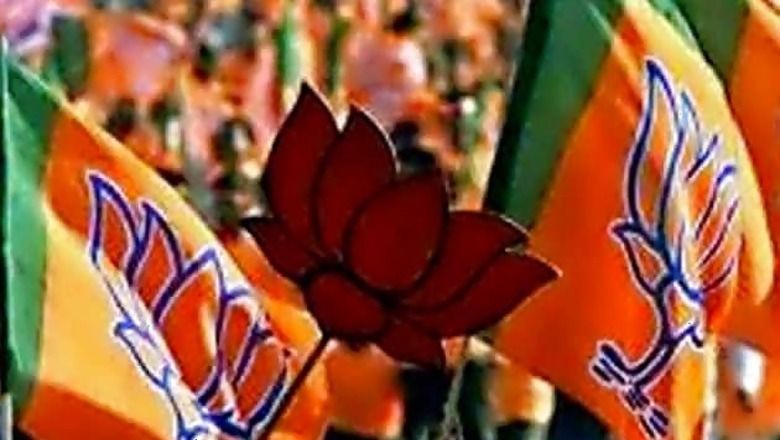
views
By Ajay K Mehra
The events at the Jawaharlal Nehru University (JNU) have brought out an aggressive Bharatiya Janata Party (BJP) in a hurry to use this opportunity to redefine Indian politics with an aggressive nationalism. The ephemeral dividends of the strategy would indeed make the party brass happy, but it inheres durable dangers for the society, the polity and, more importantly, for the party.
Significantly, the party does not need to be in such a rush as politically it has never been so stable, though it does need to work harder in order to reach the stage where the party system is known with its name, à la the Congress system. But the Congress reached that stage for being integral to the national movement and the party system. Keshav Baliram Hedgewar, who founded the RSS four years after he was charged with sedition by the British government in 1921 and decided to keep the RSS out of the national movement, and Shyama Prasad Mookherjee, who founded the Bharatiya Jan Sangh (BJS) in 1951 and sought and got RSS support to have an organisational core for his party, were also in the Congress at significant point of their careers.
Also, the Congress alone was organisationally ready to take the plunge when the electoral system began. Obviously, these are different times, a different era, where the BJP's strength would be to create a mass organisation on the governance platform of Prime Minister Narendra Modi. The master stroke of retaining the National Democratic Alliance, which shares loaves of powers with several smaller and state parties that could have been trouble shooters has precluded that possibility. More dynamic the opposition is, greater strength it would provide to a performing BJP.
In an era of intense competitive politics, the BJP's desire to remain firmly-rooted at the peak is understandable. The BJP has creditably reached its political pinnacle of ruling seven states, sharing power in four, being the main opposition in five, acquiring bases and foothold in the five southern and a few northeastern states aside from getting absolute majority in the Lok Sabha since a modest beginning in 1951. However, the twenty-first century's India-in-transition still has a sizeable section which would question its concept of Hindutva and nationalism based on it, though they may not have an objection to its acquiring the main national party status. A BJP system is neither likely to emerge, nor the party would like to have a system and process of dissent within the party, factionalism is a difficult-to-control dynamics.
Would the strategy of aggressive nationalism pay political dividends in the post-sixteenth general election politics of the country? Notably, the past decade has witnessed the Congress desperately and unsuccessfully sticking to ‘the family' to lift-up its sharply declining political fortunes.
Importantly, Rahul Gandhi has been unable to catch the imagination of the young nation. The erstwhile socialists are still in search of ever-splitting Janata Parivar and a mahagathbandhan that would stick. The Left is left-over. And, the satraps are ever-unpredictable.
The Congress's collapse created a vacuum where the Narendra Modi-led BJP could easily fill in the political space on the plank of 'opportunity', replacing the prevailing rhetoric of removing inequality. However, within eighteen months the vibrant political space in India came alive with multi-frontal attack on Narendra Modi and the BJP, which has stuck to its Hindutva-based politics wherein the national identity is a 'broadly', but hazily, defined on religious identity. If the strategy pays off, a consolidation of diverse Hindu votes could stabilise the party. In its tweaked version, it could bring in some layers of 'others' but their identity hyphenated with 'Hindu'.
Obviously, the BJP is not getting away from its politics of 'otherisation' that became its USP since Shyama Prasad Mookherjee aligned with the RSS. In 1985-90, it otherised the Muslims as 'Babar ki Aulad', the centre and the left as pseudo-secular (without a definition) and the intellectuals opposing as pseudo-intellectuals during the Ram Janmabhoomi movement. A more aggressive party post-2014 has dubbed the adherents of secularism as 'sickular'. All this while not even indicating an alternative framework of collaging (even of mosaicking) India's phenomenal diversity. The press of all hues became presstitute. Indeed, its Hindutva is a road-rolling concept of a 'unified' identity to be practiced in the length and breadth of the country. Dissent in any form is derisive and condemnable.
BJP's aggressive response (even abusive and physically violent by its generals and foot-soldiers) to the intolerance debate and now in JNU against the students of other political hues is an interesting case in point where the party and the leadership appear to be inefficiently groping with ideas to embrace India that is Bharat. A silent and miser-with-words Prime Minister is neither helping his case in a bid to tower over the past Congress leaders in India's political history, nor of the party as the claimant of the right of centre space. The strategy of appropriating one and all the past political icons - an avowedly Marxist Bhagat Singh, a strong critique of Hinduism Ambedkar, critical of the RSS Sardar Patel and a left-leaning nationalist Subhash Chandra Bose - who were unwisely neglected by the Congress has limited value, as it is based on anti-Congressism and does not add value to the party and its current strategy.
In JNU, for example, a number of things have gone wrong in a situation where a well-entrenched intelligentsia within and without, having flourished with the past regimes, is resisting its ideas and political influence in order to protect its turf. The JNU student politics has been traditionally anti-establishment. Indira Gandhi reveled in allowing it to be so while drawing support from it. As an alumnus of JNU of the 1970s, I experienced both, an unhindered freedom to develop my own critical faculties and the wrath of a cliquish faculty.
Yet, criminalising dissent while simultaneously militarising nationalism have inherent dangers; even from the BJP's current political perspective. Even while dealing with subversive sloganeering as per the law, the PM as the national leader could have restrained the party as dubbing the entire university and support bases across the country as anti-national. It is unfortunately developing a hysteria and impression that criticizing the BJP is anti-national that may not necessarily help the party in the long run. Instead the PM and his aides could have engaged the students in a constructive debate (something which the Congress failed in doing during the post-Nirbhaya protest); not of a virulent kind, but the way a knowledgeable and persuasive Sugata Bose did.
A more inclusive BJP and Narendra Modi is what India would want and it would give them greater stability.
(The author Ajay K Mehra is Honorary Director at Centre for Public Affairs in Noida. Views are personal.)



















Comments
0 comment